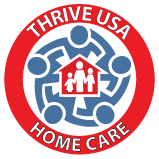Posts Tagged ‘in home care’
Downsizing Comfortably: A Guide for Seniors Considering a Smaller Home
As we journey through our golden years, many seniors find themselves contemplating the idea of downsizing to a smaller home. While the decision to move can stir up a mix of emotions, it’s often motivated by practical reasons such as easier maintenance, reduced costs, or the need for a living space that better accommodates changing physical abilities. At Thrive USA Homecare, we understand the importance of feeling comfortable, secure, and independent in the place you call home. Whether you’re considering downsizing or planning to age in place, our personalized care services are designed to support your lifestyle and enhance your…
The Importance of Long-Term Care: Thrive USA Homecare’s Comprehensive Services
As our loved ones age and their health needs evolve, finding the right care solution can be challenging. At Thrive USA Homecare, we recognize the critical role of long-term care in maintaining quality of life and providing peace of mind for families. Understanding Long-Term Care Long-term care enables individuals to “live as independently and safely as possible when they can no longer perform everyday activities on their own,” as defined by the National Institute on Aging. This care often encompasses a range of services, from basic housekeeping and meal preparation to more intensive personal care like bathing and grooming assistance….
Embracing Graceful Aging with Thrive USA Homecare
At Thrive USA Homecare, we believe that aging gracefully is about more than just appearance—it’s a mindset and a way of life. We’re dedicated to helping seniors and older adults live their golden years with respect, dignity, and fulfillment. Here are some key aspects of graceful aging that we prioritize in our care: Preserving Independence Many seniors worry about losing their independence as they age. At Thrive USA Homecare, we understand the importance of maintaining autonomy. Our in-home care services are designed to support seniors in their daily tasks while allowing them to remain in the comfort of their own…
Promoting Brain Awareness and Care during Alzheimer’s and Brain Awareness Month
June is an important month for the global community as it marks Alzheimer’s and Brain Awareness Month. This dedicated time provides an opportunity to raise awareness about Alzheimer’s disease, educate the public about brain health, and emphasize the importance of supporting individuals and families affected by this condition. At Thrive USA Homecare, we recognize the significance of Alzheimer’s and Brain Awareness Month and are committed to promoting brain health and providing exceptional care for those living with Alzheimer’s disease. In this blog, we will explore the importance of this month and discuss how home care agencies can play an important…
Navigating Mental Health Concerns During the Senior Years
As individuals enter their senior years, they embark on a new phase of life characterized by unique challenges and opportunities. While this stage can be fulfilling and rewarding, it is not without its share of mental health concerns. Addressing and navigating these concerns becomes increasingly important to ensure the well-being and quality of life of older adults. In recent years, there has been a lot of talk about mental health, spurred by celebrities and public speakers sharing their experiences. Still, far too many seniors believe that mental health difficulties are a sign of personal failure or weakness. This could lead…
Tips for Home Caregivers to Reduce Stress and Improve Well-Being
Being a home caregiver is a noble and challenging role. Whether you’re caring for an aging parent, a sick loved one, or someone with a disability, it’s essential to prioritize your own well-being. The demands of caregiving can be physically, emotionally, and mentally draining, often leading to high levels of stress. However, by implementing certain strategies, you can reduce stress and enhance your overall well-being. In this blog, Thrive USA Home Care will explore practical tips for home caregivers to find balance, prioritize self-care, and navigate the caregiving journey more effectively. Seek Support: One of the most important steps you…
Health Benefits of Pets for Seniors
Many family caregivers know that the seniors they care for may suffer from loneliness and depression, which can lead to long-term physical health problems. But did you know that you might be able to get some relief from this loneliness at the local animal shelter or pet store? American pet owners adore them! According to recent surveys, there are pets in two out of every three American homes, a 20% increase in the last thirty years. The health advantages of dogs for seniors and the outpouring of love for our furry friends are real and long-lasting, according to medical studies. …
A Day in the Life of a Thrive USA Caregiver
Caring for older family members who are sick or aging is demanding. You can decide what support and assistance your loved ones need by learning more about what a typical caregiver’s day entails. When you start caring for a sick older relative, you will quickly realize that there is no such thing as a routine weekday. Caregivers may care for numerous clients in a week or only one client they care for around the clock. Some people may have to assist their patients in traveling to a hospital for treatment, running errands, or helping with household chores and providing companionship …
Care Following a Hospital Discharge
A journey to the hospital might last several days for an older adult, and medical procedures can bring a slew of additional caregiving tasks that persist long after the patient returns home. Older adults frequently require higher levels of care during a hospital stay, which translates into higher care needs after discharge. It is key that family caregivers completely understand what is required as soon as possible, as this will better equip them to coordinate the care required to keep their loved ones safe and recuperate. Preparation is Key Caring for a loved one following a hospital discharge can be…
6 Helpful Tips When Your Aging Parents Reject Home Care
When seniors refuse help, it can be frustrating for family caregivers. As your parent or loved one ages, you want to make sure they are protected and well-cared for, but you also don’t want to compromise their freedom and independence. It might be difficult or uncomfortable, but discussing in-home care is essential to ensuring your loved one’s happiness and quality of life. Here are some suggestions on what to do if an elderly parent refuses caregiving or assisted living services. Learn and Observe Think about the services your parent needs first before bringing up assisted home care. Observe their daily…












